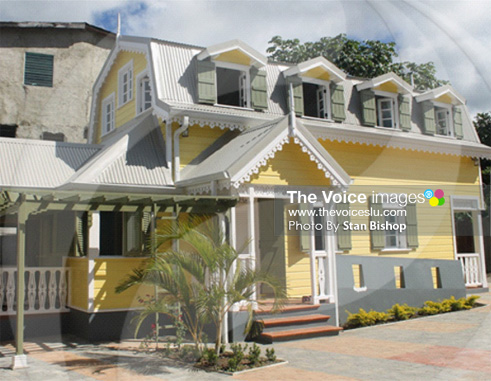LESS than three months after Sir Derek Walcott has been laid to rest, his countrymen still find themselves wanting as far as pride for country is concerned. It is no secret that the Nobel Prize-winner’s love for country knew no bounds. In fact, while still a teenager, he literally “wrote the tale by tallow of a city’s death by fire” following the great fire that decimated Castries in 1948.
Today, his restored childhood home at Chaussee Road, its original objective being to create a fervent fire – albeit metaphorically — in the artistic community, has had its doors shut a year and a half following its official opening.
One of the best-known clichés is that Sirs Derek and Arthur (Lewis) “put Saint Lucia on the map” through their sheer brilliance and dogged perseverance. They are often used as metaphors for the epitome of greatness. Schoolchildren especially are taught that if Sirs Derek and Arthur – and Daren Sammy and Levern Spencer – can do it, so can they. At times, however, it seems that our words and actions are in dissonance.
With both laureates now gone, some of us still find our consciousness dead, still grappling towards achieving higher literacy and economic stability. Today, a false sense of pride that emerges at fleeting opportune moments continues to mask that real truth: a deep-seated self-defeatist mentality that mocks real blessings.
Not surprisingly, the Saint Lucia National Trust’s missive this week that Walcott Place, which it administers, will be shut down indefinitely due to budget cuts, notably the loss of the $700,000 annual government subvention as of this year. After much pomp and great words at the opening ceremony before Sir Derek’s living eyes, the dream that was being touted then as a gateway to revitalizing the creative sector and the nearby community, has now become a nightmare.
The bitter truth, though, is that Walcott Place remained shut for most of the past eighteen months. Save for a couple events held there during this year’s Nobel Laureate Festival, the building was not put to use by the SLNT, which was supposed to have organized tours through the city that culminated at the new landmark. In fact, one SLNT staffer had indicated at the launch that tours were to begin three weeks later. Today, that’s another dream deferred.
Notwithstanding the trying circumstances the SLNT finds itself facing, some sense of civility must exist between the SLNT and central government. What many perceive to be a battle of egos has now gone beyond the political viewpoints and merits — that the Trust does need government support — to the eroding of national pride.
Those who excel should be celebrated and not berated, unappreciated and disrespected. We need to show a greater level of pride in those who sometimes spend their lives blazing trails so that we can feel that we, too, can achieve greatness.
The Trust is partly to blame for Walcott Place being under-utilized for the past eighteen months. Surely, by now the venue could have been used for a myriad of events. But the government also shares that blame because Culture, Urban Renewal, Empowerment and Social Justice are portfolios that form part of the ministerial clusters. Surely, Walcott House must fall under one of them.
Even more insulting is that the Taiwanese government would have demonstrated its generosity via millions of dollars towards making Walcott Place part of its overall reality. Are they to accept that their taxpayers’ dollars should be converted into pink elephants of shame and dispute?
When the first tranche of US$500,000 towards the mobilization stage of Walcott House was presented to former Prime Minister Dr. Kenny Anthony in October 2014, former Taiwanese Ambassador James Chang noted that the cultural landmark aimed at being “a centre for interpretation, inspiration, learning and celebration of the Walcotts’ artistic genius”.
Minister for Urban Renewal, Stanley Felix, had described the project as “bold and ambitious” and that it was “the boldest statement at urban renewal any government has undertaken thus far”.
Had he still been alive, Walcott, known for shedding a tear or two about his countrymen’s high-valued apathy, would not only be insulted by the fact that not many people here read his works but that they also fail to comprehend what a fitting honour is.














